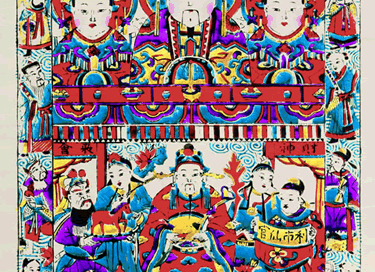Zao Shen in China is the Kitchen God (god of the hearth), is believed to report to celestial gods on family behavior and to bestow poverty or riches on families. The Kitchen God was often represented with his wife, or, as shown in the image with his two wives. The Roman Goddess Vesta appears to correspond to this God.
Chinese people believe that gods are living everywhere around us, for example, the door god, the kitchen god, and the gods of lightning and thunder.
Quote: 财神 (cáishén) (the God of Wealth) is the god in charge of money. He is widely worshipped by Chinese people. In China, people believe there are several Gods of Wealth, among whom Zhao Gong Ming is the most popular. He has a black face, wears battle armour and a helmet, and carries a golden wheel and metal chain on the back of a black tiger.
灶神 (zàoshén) (the Kitchen God) is the most important Chinese domestic god who takes charge of people’s diet, grants conveniences in life, and also examines the good or evil of the family.
Many Chinese people believe in 门神 (ménshén) (the Door God) as well. The representatives of the Door Gods are Qin Shubao and Gong Yuchi. The Chinese believe that the Door Gods live in the doors of every family, protecting their homes, and preventing ghosts and evil spirits from entering their homes.
https://www.confuciusinstitute.ac.uk/fortune-god-kitchen-god-door-god-gods-at-chinese-new-year/
The Penates are the household gods who watch over the penus - the larder the household store of a home. They were originally honoured at the family hearth but later came to include also the particular deities a family worshiped.
http://www.novaroma.org/nr/Penates
Securitas Roman goddess, a personification of security.
Portunus, Portumnus Roman god of gates, doors and harbours. In other words, a god associated with the entrance to both the city and the home.
Mercia The goddess who personified laziness
Molea Goddess of grindstones for milling bread also a daughter of Mars, and worshipped by millers
Sentinus God who gave sensation to the fetus
Statulinus God who helps the newborn to walk
Subigus God of the wedding night, the nupituals
Sanctus, Fidius Dius, Saber, Semipater God of the oaths. Some of this function was shared with Iupeter
Numeria Goddess in charge of numbers, counting, arithmetic and mathematics overall
Occator Diety responsible for harrowing the soil
Penates, Di Penates Roman household gods. Originally they were gods of the storeroom (penus), but their role gradually expanded to include the entire household. They were associated with, but not identical with,other household deities such as Vesta and the Lares. They were represented by small statues gathered together in a household shrine, to which offerings of food were made. The Roman state also had its Penates, the Penates Publici, which were the focus of a state cult.
Statue of Shang Di, The Celestial Emperor and male half of God in Chinese Religion.




